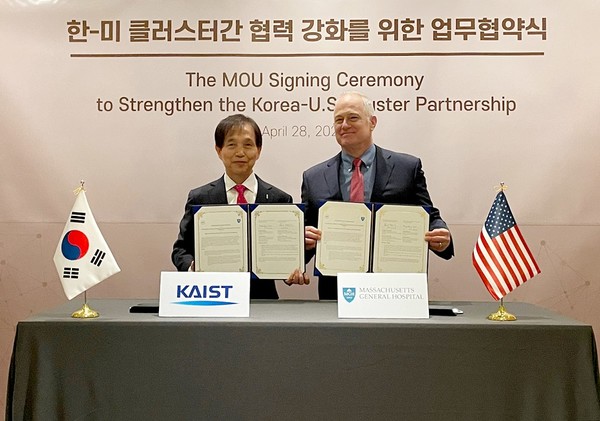
On April 28, KAIST announced the signing of a memorandum of understanding (MOU) with Massachusetts General Hospital (MGH) and biotechnology company Moderna at Langham Hotel in Boston, US.
MGH, the largest teaching hospital of Harvard Medical School, is renowned for innovative medical practices and for operating the Mass General Research Institute, the world’s largest hospital-based research program. With an annual research budget exceeding 1 billion USD, the institute has produced over 13 Nobel Prize winners in Physiology or Medicine. Through this MOU, KAIST aims to collaborate with the US ecosystem of medicine and engineering, develop a Korean-style convergent education program, and strengthen the foundation for the establishment of a specialized graduate school of science, technology, and medicine at KAIST. KAIST also plans to develop exchange programs with MGH, including practical training and research opportunities for students.
An MOU between KAIST and Moderna was also signed on the same day. This partnership seeks to nurture medical science professionals at the KAIST Graduate School of Medical Science by facilitating discussions on vaccine and drug development, virus research, and joint research on mRNA for rapid technology commercialization. Moderna, which began as a research-stage company focused on mRNA programs, has evolved into a company with a diverse clinical portfolio spanning seven therapeutic areas, including vaccines and treatments. The company is currently running 48 programs across 45 development candidates, with 38 of them in clinical trials. This collaboration aims to leverage Moderna’s extensive experience and expertise to bolster research and development efforts.
KAIST President Kwang-Hyung Lee highlighted the significance of partnering with MGH and Moderna, two highly influential organizations within their individual sectors. He expressed his commitment to fostering global leaders in physician-scientist roles and bio-health businesses, addressing rising human health problems, and enhancing the nation’s R&D and industry through collaboration with both institutions.

